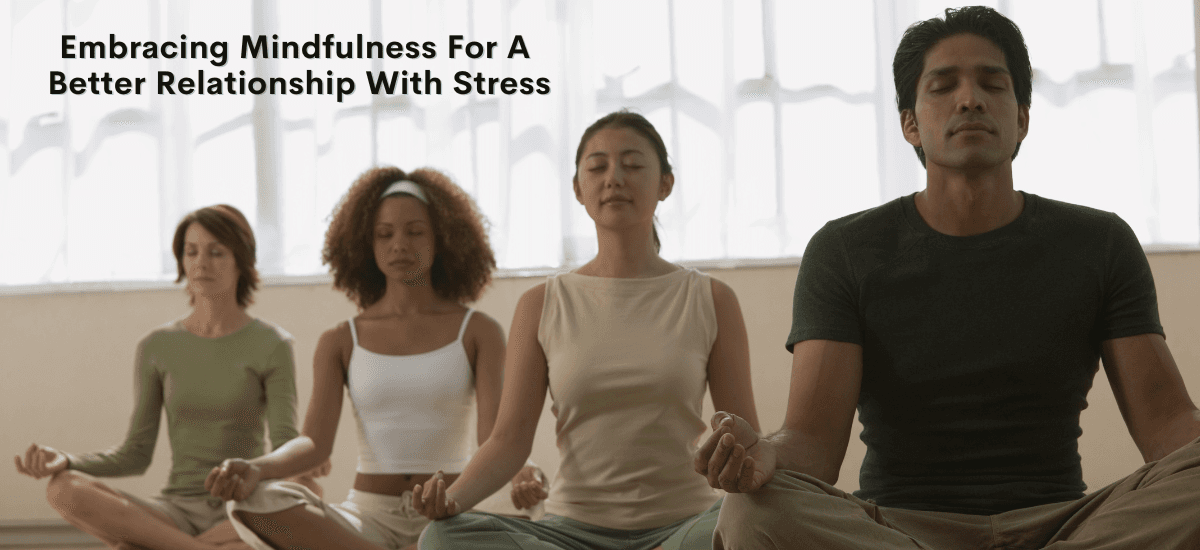Embracing Mindfulness For A Better Relationship With Stress

Stress is a part of everyone’s life and can often be seen as a negative thing. However, stress can also be a positive force in our lives if we learn how to manage it properly. Improving our relationship with stress can lead to better mental and physical health, as well as increase our productivity and overall happiness. In this blog, we will discuss the effects of stress, the benefits of managing it, and how to improve our relationship with stress.
The Effects of Stress
Stress can have a significant impact on our physical and mental health. Physically, stress can lead to headaches, digestive problems, and decreased immune function. Mentally, stress can cause anxiety, depression, and a decline in cognitive function. Chronic stress can also contribute to more serious health problems such as heart disease, high blood pressure, and stroke.
One of the biggest problems with stress is that it can easily become a vicious cycle. The more stressed we are, the more difficult it becomes to manage our stress levels. This can lead to a decline in our mental and physical health, which in turn can increase our stress levels even further.
The Benefits of Managing Stress
Managing stress can lead to many benefits for our mental and physical health. Some of these benefits include:
- Improved mental health: By managing our stress levels, we can reduce anxiety and depression, and improve our overall mood. This can lead to better mental health and a greater sense of well-being.
- Increased physical health: By reducing the physical effects of stress, we can improve our overall physical health and reduce our risk of developing chronic health problems.
- Improved productivity: By managing our stress levels, we can increase our focus and productivity, which can lead to better performance at work and in our personal lives.
- Increased happiness: By reducing stress, we can improve our overall happiness and satisfaction with life. This can lead to greater satisfaction with our relationships, work, and overall sense of well-being.
Improving Our Relationship with Stress
Improving our relationship with stress requires a combination of lifestyle changes and stress management techniques. Here are some tips to help you improve your relationship with stress:
- Prioritize self-care: Taking care of ourselves is essential for managing stress. This includes getting enough sleep, eating a healthy diet, and engaging in physical activity.
- Practice mindfulness: Mindfulness can help us become more aware of our thoughts and feelings, which can help us better manage stress. Try practicing mindfulness through meditation, yoga, or simply taking time to reflect and be present in the moment.
- Manage time effectively: Effective time management can help reduce stress by reducing the feeling of being overwhelmed or overworked. This can be achieved through setting priorities, making to-do lists, and delegating tasks when necessary.
- Seek support: Having a support system is essential for managing stress. This can be achieved through talking to a friend, family member, or therapist.
- Limit caffeine and alcohol: Consuming too much caffeine or alcohol can increase stress levels, so it’s important to limit our intake.
- Practice stress-management techniques: There are many stress-management techniques that can be effective for managing stress. Some of these include deep breathing exercises, progressive muscle relaxation, and guided imagery.
Conclusion
In conclusion, Careme Health is dedicated to providing affordable, evidence-based, and personalized care. Our approach is unrivaled in the market, offering world-class care, Improving our relationship with stress that ensures the best possible outcomes for our clients. Our therapists are widely regarded as the best in India, and our online counseling services are widely regarded as the best in the country. We are proud to be a leading provider of online mental health services in India and strive to continue providing top-quality care to our clients
Related Articles

Letting Go With Grace: Emotional Tools for Closure
Letting go is never easy. Whether we are parting ways with a loved one, ending a relationship, leaving a job, or saying goodbye to a cherished chapter of life, the emotional weight can feel overwhelming. Yet, closure is essential for our emotional well-being. Without it, we carry unresolved grief, anger, regret, or longing that can seep into new relationships and experiences, holding us back from healing and growth.

Breakup Blues: How to Cope and Rebuild Your Self-Worth
A breakup often feels like a silent earthquake—unseen by others but devastating within. The pain doesn’t just come from the loss of a relationship, but from the crumbling of the life, identity, and future you built with another person. You may find yourself questioning your worth, doubting your value, and feeling isolated even when surrounded by people. In Indian society, where emotional expression is often discouraged and breakups can be stigmatized, this pain may feel even more overwhelming. But the truth is—while breakups may shake you, they do not define you. You are not broken; you are in a process of emotional reformation. And with the right tools, guidance, and support system, you can rebuild not just your self-worth but also your entire life narrative.

Healing After Heartbreak: A Mental Health Perspective
Heartbreak doesn't just break your heart—it can shatter your sense of identity, peace, and purpose. Whether the end was expected or abrupt, mutual or one-sided, short-lived or long-term, the aftermath often leaves people emotionally disoriented. In Indian culture, where societal expectations and family involvement in romantic relationships are prevalent, the pain is not just personal—it is public. Yet, very few are taught how to heal from emotional loss in a healthy, sustainable way.

Boundaries in Love: Saying ‘No’ Without Guilt
Love, in its truest form, should be a safe space—a space where individuality is not only respected but celebrated. Yet, in many relationships, especially in the Indian cultural context, love is often misunderstood as constant availability, complete sacrifice, and putting the other person first, always. As noble as this may sound, this version of love often leads to emotional exhaustion, suppressed resentment, and the erosion of one’s identity.

Gaslighting in Relationships: What It Is and How to Heal
Gaslighting is a form of emotional abuse that erodes your ability to trust your own perception. It’s a slow, insidious process that often begins with subtle doubts and ends with complete self-questioning. In romantic relationships—especially in the Indian context where silence, compromise, and duty are often mistaken for love—gaslighting can be even harder to recognize.

How Depression Can Affect Your Relationship—And What You Can Do
Depression is not just an internal struggle—it ripples outward, affecting relationships, routines, and the emotional fabric that holds people together. When someone is dealing with depression, it's not only their world that becomes dim—it can cast a shadow over their most intimate connections too. In a country like India, where open conversations about mental health are still rare and love is often equated with endurance, depression within a relationship can become invisible, misunderstood, or misjudged.
